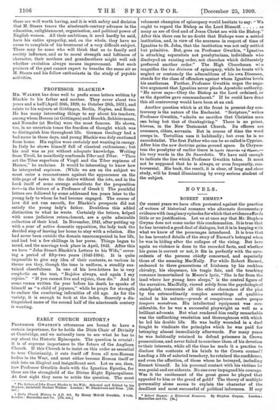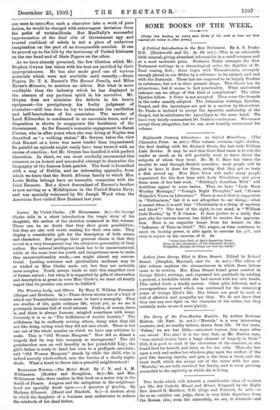NOVELS.
ROBERT EMMET,*
OF recent years we have often protested against the practice of writers of historical romance who alternate documentary evidence with imaginary episodes for which that evidenceaffol•ds little or no justification. Let us at once say that Mr. Stephen Gwynn does not come under this condemnation. It is true that he has invented a good deal of dialogue, but it is in keeping with what we know of the personages introduced. It is true that he has invented details of the story of Emmet's betrayal when he was in biding after the collapse of the rising. But here again no violence is done to the recorded facts, and whether his guess is correct or not, it fits in perfectly with the ante- cedents of the persons chiefly concerned, and especially those of the amazing MacNally. For while Robert Emmet, endeared to three generations of Irishmen by his reckless chivalry, his eloquence, his tragic fate, and the touching romance immortalised in Moore's lyric, "She is far from the land where her young hero sleeps," is the central figure of the narrative, MacNally, viewed solely from the psychological standpoint, transcends all the other characters of the plot by the extraordinarily complex assemblage of qualities united in his nature,—grande et conspicuum nostro quoque tempore monstrum. His intellectual equipment was con- siderable, for he was a successful playwright as well as a brilliant advocate. But what rendered him really remarkable was the unflinching resolution and thoroughness with which he led his double life. He was badly wounded in a duel fought to vindicate the principles which he was paid for betraying almost immediately afterwards. For many years he was habitually retained to defend prisoners in Crown prosecutions, and never failed to convince them of his devotion to their interests, while all the time he made it a practice to disclose the contents of his briefs to the Crown counsel ! Leading a life of salaried treachery, he retained the confidence, and even the affection, of those whom he betrayed, including Emmet himself. In his personal contact with his victims be was genial and considerate. No one ever impugned his courage. Was it the excitement of the great game he played that appealed to him or the greed of gold P The theory of multiple personality alone seems to explain the character of the deadliest and most successful of political informers. If any • Robert Emmet: a Historical Romance. By Stephen Gwynn. London: Macmillan and Co. [Ss.]
one were to introi:PAce such a character into a work of pure fiction, he would be charged with extravagant deviation from the paths of verisimilitude. But MacNally's successful impersonation of the dual role of Government spy and trusted confidant of rebels is not a piece of audacious imagination on the part of an irresponsible novelist. It can be proved up to the hilt by the testimony of United Irishmen on the one hand and of State Papers on the other.
As we have already premised, the few liberties which Mr. Stephen Gwynn has taken with his text are justified by their appropriateness. He has also made good use of various materials -which were nob available until recently,—State Papers, Dr. T. A. Emmet's The Emmet Family, and Miles Byrne's Memoirs, to mention no others. But what is more creditable than the industry which he has displayed is the absence of any partisan spirit in his narrative. Mr. Gwynn does not minimise the defects in his hero's equipment—his precipitancy, his faulty judgment of character—still less does he try to extenuate the vacillation and half-heartedness of his associates. The murder of Lord Kilwarden is condemned in no uncertain tones, and no disposition is shown to exaggerate the harshness of the Government. As for Emmet's romantic engagement to Sarah Curran, who in after years when she was living at Naples was described as " a walking statue," Mr. Gwynn takes the view that Emmet as a lover was more tender than impassioned. So painful an episode might easily have been treated with an excess of emotion ; but Mr. Gwynn has handled it with perfect discretion. In short, we can most cordially recommend this romance as an honest and successful attempt to dramatise the biography of the famous Irish patriot. The book is furnished with a map of Dublin, and an interesting appendix, from which we learn that the South African family to which Mrs. Louis Botha belongs have no traceable connexion with the Irish Emmets. But a direct descendant of Emmet's brother is now serving as a Midshipman in the United States Navy, and was specially welcomed by Sir Joseph Ward when the American fleet visited New Zealand last year.



































 Previous page
Previous page